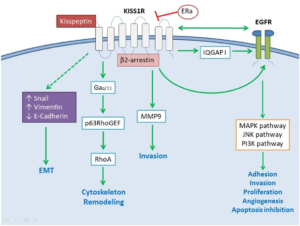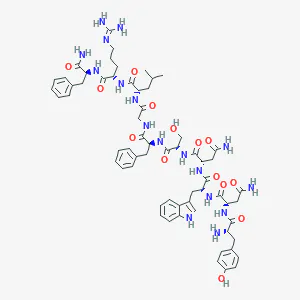Boosting Gonadotropin-Releasing Hormone
Kisspeptin-10, a derivative of the kisspeptin protein, has gained substantial attention in recent research due to its significant role in stimulating the release of Gonadotropin-Releasing Hormone (GnRH), a critical hormone for sexual development and reproduction.
Multiple studies suggest that Kisspeptin-10 can stimulate GnRH release directly at GnRH nerve terminals. This finding suggests a new point of action for Kisspeptin-10, opening avenues for potential therapeutic applications.
Research has also shown that Kisspeptin-10's stimulation of gonadotrophin secretion in women is modulated by sex steroid feedback. This insight could have important implications for understanding hormonal balance and reproductive health in females.
Increasing Testosterone
Kisspeptin-10 is a potent Luteinizing Hormone (LH) stimulator and can increase LH pulse frequency. Research has shown that boluses of Kisspeptin-10 can significantly evoke LH secretion in men, and continuous infusion of Kisspeptin-10 can increase testosterone levels, LH pulse frequency, and pulse size.
Moreover, studies have indicated that Kisspeptin-10 administration can increase LH pulse frequency and secretion in hypotestosteronaemic men with Type 2 Diabetes Mellitus (T2DM), providing proof-of-concept evidence.
In adolescents at Tanner stage V, the administration of Kisspeptin-10 has been found to significantly increase plasma LH and testosterone levels.
Interestingly, Kisspeptin-10 has also been linked to several potential benefits beyond hormone regulation. This includes increasing sexual arousal, improving mood and behavior, and regulating fertility.
This peptide is also suggested as a beneficial addition to Testosterone Replacement Therapy to maintain fertility and deter testicular atrophy.
Energy Balance
Kisspeptin-10 plays a significant role in regulating energy balance.
Research has shown that kisspeptin neurons are active players in controlling energy balance. They will likely mediate the well-established link between energy balance and reproductive function.
Accumulating data from animal models suggests that kisspeptin signaling regulates a wide variety of metabolic parameters, including body weight and energy. This suggests that Kisspeptin-10 may have a direct role in regulating energy balance.
In the context of reproduction, energy balance is closely related. Hypothalamic kisspeptin is believed to mediate the regulation of energy balance. Disturbances in positive and negative energy balance often result in impairments of fertility, such as hypothalamic hypogonadism.
Moreover, certain research suggests that Brain-Derived Neurotrophic Factor (BDNF) could be a critical effector by which melanocortin-4 receptor-mediated signaling regulates energy balance, and Kisspeptin-10 may play a role in this process.
Finally, evidence suggests that peripheral hormones like ghrelin and PYY3-36, along with the central neuropeptide kisspeptin, are 'novel' players in the neuroendocrine networks that regulate energy balance.
Cancer Research
Kisspeptins have been shown to play a role in cancer growth and metastasis. They are often overexpressed in malignant tumors, including breast, ovarian, and prostate cancers. Additionally, Kisspeptin signaling can inhibit cancer cell migration and invasion, suggesting a potential therapeutic role.
Specifically, in the context of breast cancer, Kisspeptin-10 has been found to inhibit the migration and invasion of breast cancer cells. It acts by regulating specific molecular pathways that are involved in cancer progression.

Source: ScienceDirect
Moreover, Kisspeptin-10 has demonstrated anti-metastatic effects in melanoma, another type of cancer. It was found to suppress the invasion and migration of melanoma cells, suggesting its potential use in melanoma treatment.
However, while these findings are promising, more research is needed to fully understand the role of Kisspeptin-10 in cancer and to develop effective therapeutic strategies.
Studied Memory Enhancement
A few studies have hinted at possible links between kisspeptin and cognitive functions. For instance, a study on rats found that intracerebroventricular (ICV) administration of kisspeptin enhances memory retention. The exact mechanism behind this effect is not clear, but it's suggested that it may involve modulation of neuronal activity.
There are also some suggestions that kisspeptin could influence brain regions involved in mood and cognition, such as the hippocampus and amygdala. However, the evidence is indirect, and more research is needed to establish a clear link between kisspeptin, particularly Kisspeptin-10, and memory enhancement.
Impact on Mood
Recent investigations have sought to explore Kisspeptin-10 potential impact on mood and emotional regulation. Research has indicated that kisspeptin administration can modulate human brain connectivity, enhancing sexual and emotional functions. It was found to affect both positive and negative emotions and feelings.
In another study, kisspeptin administration was linked to reduced negative moods. However, the study did not find effects on other relevant hormones that could affect limbic activity.
A review of the literature reflects the emerging influence of kisspeptin signaling in behavior, emotion, and cognition. This suggests that Kisspeptin-10 may have a role in these processes, although more research is needed to confirm this.
Studies have also demonstrated the antidepressant-like effects of kisspeptin and its effects on fear, suggesting potential roles in emotional processing.
A study on food intake suggested that kisspeptin could mediate the relationship between sex, emotion, and reproduction.
Kidney and Heart
Kisspeptin-10 might have potential implications for heart and kidney health.
Research indicates that branched-chain amino acids (BCAAs), including leucine, valine, and isoleucine are mostly catabolized in cardiac muscle and the kidneys. The effects of Kisspeptin-10 on this metabolic process are being studied.
In another study, Kiss1R mRNA, associated with the Kisspeptin receptor, was expressed in the kidney, heart, and aorta. This discovery could suggest a role for Kisspeptin-10 in these organs' functioning, although more research is needed to confirm this.
Further research suggests that Kisspeptin-10 may serve as a novel therapeutic target for atherosclerotic cardiovascular diseases, given its potent vasoconstrictor properties.
Kisspeptin-10 has also been observed to stimulate LH (Luteinizing Hormone) and increase blood pressure, heart rate, peripheral oxygenation, and liver function. Its impact on renal function is also of interest.
The expression of Kisspeptins and the Kisspeptin receptor in the kidneys of rats with chronic renal failure has also been studied, suggesting a role for Kisspeptin-10 in renal health.
In the context of Chronic Kidney Disease (CKD), research has explored the use of a Kisspeptin-1 receptor antagonist peptide to address uremic cardiomyopathy, a condition characterized by structural and functional changes in the heart.
Please note that all the articles and product information provided on this website are intended for informational and educational purposes only.
The products offered on this platform are specifically designed for in-vitro studies, meaning they are conducted outside the body. It is important to clarify that these products are not medicines or drugs, and the FDA has not approved them for the prevention, treatment, or cure of any medical condition, ailment, or disease.

